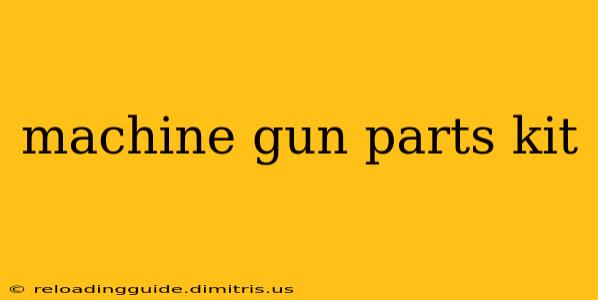The world of firearms is complex, and few areas are as nuanced and heavily regulated as machine gun parts kits (MG parts kits). This guide provides a comprehensive overview of what these kits are, their legal implications, and the crucial factors to consider if you're even remotely interested in them. Disclaimer: This information is for educational purposes only and should not be interpreted as legal advice. Always consult with legal counsel and relevant authorities before purchasing or handling any firearm parts, especially those associated with machine guns.
What is a Machine Gun Parts Kit?
A machine gun parts kit typically comprises the various components necessary to assemble a fully functional machine gun, excluding the receiver. The receiver is the serialized part of a machine gun, considered the firearm itself under federal law. These kits often include parts like the bolt carrier group, barrel, trigger group, and other components. The exclusion of the receiver is a key element distinguishing them from complete, assembled machine guns.
The Legal Landscape of Machine Gun Parts Kits
The legality of owning a machine gun parts kit is significantly dependent on your location and the specific components included. Federal law in the United States strictly regulates machine guns, and owning one without proper licensing is a serious federal crime. Many states also have their own regulations, which can be more restrictive than federal law.
Key Legal Considerations:
- Registration: Under the National Firearms Act (NFA), machine guns manufactured before 1986 must be registered with the Bureau of Alcohol, Tobacco, Firearms and Explosives (ATF). This is crucial, even if dealing with a parts kit.
- Receiver: The absence of a receiver in a parts kit is a key aspect of their legality. However, possessing a kit with the intention of assembling a machine gun without the appropriate licenses is still a serious offense.
- State Laws: State laws vary widely. Some states have stricter regulations than the federal government, potentially prohibiting the possession of even unregistered machine gun parts kits.
- Intent: The ATF scrutinizes the intent of the purchaser. Buying a parts kit with the clear intention of assembling a functional machine gun without the required licenses will likely lead to legal repercussions.
Types of Machine Gun Parts Kits
Several types of MG parts kits exist, each with varying degrees of completeness and implications:
- Complete Kits: These contain almost all the parts needed to assemble a machine gun, excluding the receiver. These kits often come with a parts list and sometimes even instructions (though these should be used with extreme caution).
- Incomplete Kits: These kits lack certain parts and may require additional components sourced elsewhere to build a complete machine gun. This can be more challenging and potentially increase legal risks if the missing components raise concerns.
- Obsolete Kits: Kits for older, less common machine gun models might be less strictly regulated than newer ones, but that doesn't eliminate the need for careful legal consideration.
Risks Associated with Owning Machine Gun Parts Kits
Even if you believe the kit is legal in your jurisdiction, there are significant risks:
- Legal Penalties: Possessing unregistered machine gun parts with the intent to manufacture a machine gun can result in hefty fines and imprisonment.
- ATF Investigation: The ATF actively investigates suspicious activity involving firearms, and owning MG parts kits might trigger an investigation.
- Reputational Damage: Association with such items can carry negative repercussions, depending on circumstances.
Responsible Gun Ownership and Machine Gun Parts Kits
Responsible gun ownership is paramount. If you're interested in collecting or studying machine guns, it's crucial to do so within the bounds of the law. Consider seeking legal counsel or contacting the ATF for guidance before even considering the purchase of any parts kits.
This information should provide a better understanding of the complexities surrounding machine gun parts kits. Remember, this is not legal advice, and you must always adhere to local, state, and federal laws. Improper handling of these components can lead to severe consequences.

